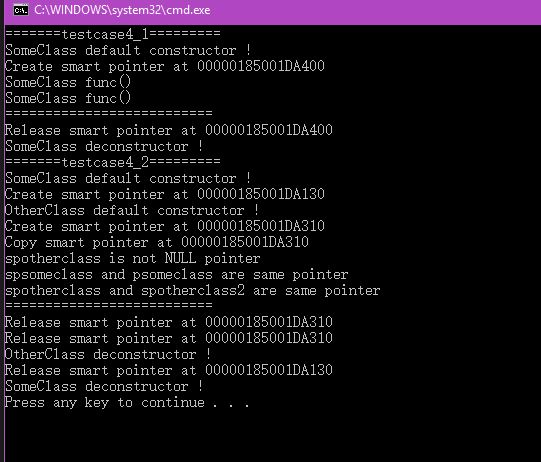Here is my implementation of SmartPointer. It is intrusive and tiny. How can I improve it?
For example, constexpr, nonexcept, try-catch-throw, and etc.
smartpointer.h
/*
* file name : smartpointer.h
*/
#ifndef __SMARTPOINTER_H__
#define __SMARTPOINTER_H__
#define COMPARE(_op_) \
bool operator _op_ (const SmartPointer& o) const { \
return mPointer _op_ o.mPointer; \
} \
bool operator _op_ (const T* o) const { \
return mPointer _op_ o; \
}
template <typename T>
class SmartPointer {
public:
SmartPointer():mPointer(NULL) {std::cout <<"Create null smart pointer."<< std::endl;}
SmartPointer(T *p):mPointer(p) {
std::cout <<"Create smart pointer at "<<static_cast<const void*>(p)<<std::endl;
if (mPointer) mPointer->incRefCount();
}
~SmartPointer(){
std::cout << "Release smart pointer at "<<static_cast<const void*>(mPointer)<<std::endl;
if (mPointer && mPointer->decRefCount()==0) delete mPointer;
}
SmartPointer(const SmartPointer &other):mPointer(other.mPointer) {
std::cout <<"Copy smart pointer at "<<static_cast<const void*>(other.mPointer)<<std::endl;
if(mPointer) mPointer->incRefCount();
}
SmartPointer &operator = (const SmartPointer &other) {
T *temp(other.mPointer);
if (temp) temp->incRefCount();
if (mPointer && mPointer->decRefCount()==0) delete mPointer;
mPointer = temp;
return *this;
}
T& operator* () const {return *mPointer;}
T* operator-> () const {return mPointer;}
COMPARE(==);
COMPARE(!=);
private:
T *mPointer;
};
class RefBase
{
public:
RefBase() : mCount(0){ }
void incRefCount(){
mCount++;
}
int decRefCount(){
return --mCount;
}
int getRefCount() const {
return mCount;
}
virtual ~RefBase(){};
private:
int mCount;
};
#endif // __SMARTPOINTER_H__
sptestcase4.cpp (test case)
/*
* file name : sptestcase4.cpp
*/
#include <iostream>
#include "smartpointer.h"
class SomeClass: public RefBase{
public:
SomeClass(){std::cout << "SomeClass default constructor !"<<std::endl;}
~SomeClass(){std::cout << "SomeClass deconstructor !"<<std::endl;}
void func(){std::cout << "SomeClass func()" <<std::endl;}
};
class OtherClass: public RefBase{
public:
OtherClass(){std::cout << "OtherClass default constructor !"<<std::endl;}
~OtherClass(){std::cout << "OtherClass deconstructor !"<<std::endl;}
void foo(){std::cout << "OtherClass foo()" <<std::endl;}
};
void testcase4_1(void)
{
std::cout << "=======testcase4_1=========" <<std::endl;
SmartPointer<SomeClass> spsomeclass = new SomeClass();
(*spsomeclass).func();
spsomeclass->func();
std::cout << "==========================" <<std::endl;
}
void testcase4_2(void)
{
std::cout << "=======testcase4_2=========" <<std::endl;
SomeClass *psomeclass = new SomeClass();
SmartPointer<SomeClass> spsomeclass = psomeclass;
SmartPointer<OtherClass> spotherclass = new OtherClass();
SmartPointer<OtherClass> spotherclass2 = spotherclass;
if (spsomeclass == NULL) std::cout<< "spsomeclass is NULL pointer" << std::endl;
if (spotherclass != NULL) std::cout<< "spotherclass is not NULL pointer" << std::endl;
if (spsomeclass == psomeclass)
std::cout<< "spsomeclass and psomeclass are same pointer" << std::endl;
if (spsomeclass != psomeclass)
std::cout<< "spsomeclass and psomeclass are not same pointer" << std::endl;
// if (spsomeclass != spotherclass) // ERROR !
// std::cout<< "spsomeclass and spotherclass are not same pointer" << std::endl;
// if (spsomeclass == spotherclass) // ERROR !
// std::cout<< "spsomeclass and spotherclass are same pointer" << std::endl;
if (spotherclass == spotherclass2) std::cout<< "spotherclass and spotherclass2 are same pointer" << std::endl;
if (spotherclass != spotherclass2) std::cout<< "spotherclass and spotherclass2 are not same pointer" << std::endl;
std::cout << "==========================" <<std::endl;
}
int main(void)
{
testcase4_1();
testcase4_2();
return 0;
}


std::enable_shared_from_thisin order to provide that very functionality. \$\endgroup\$